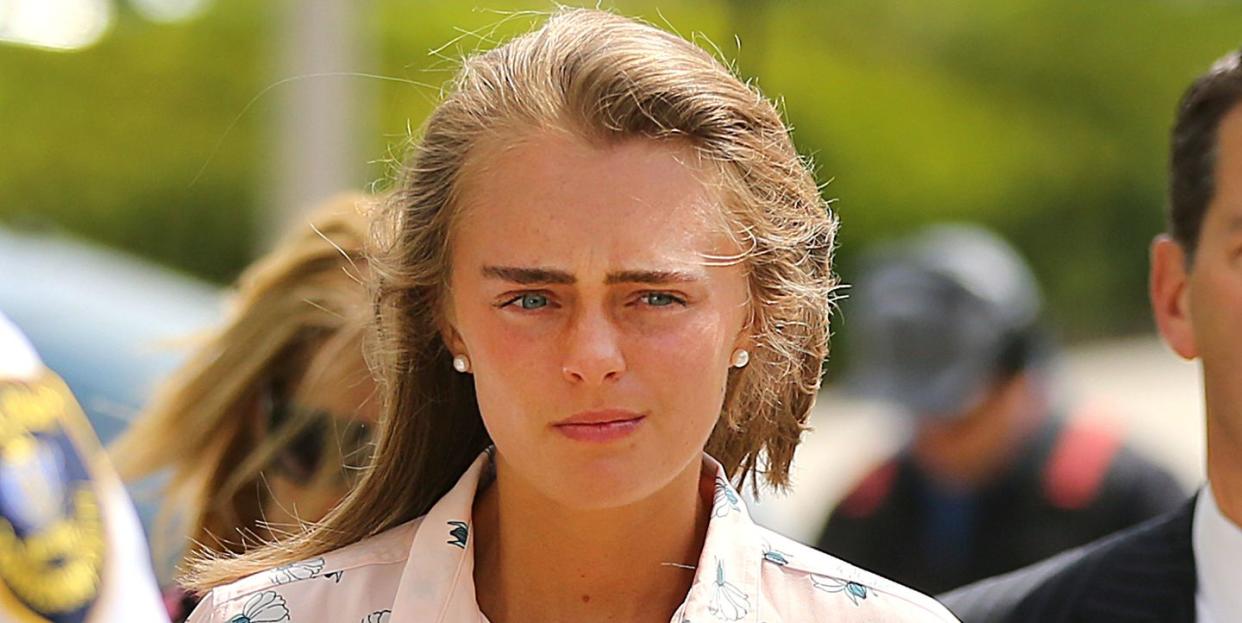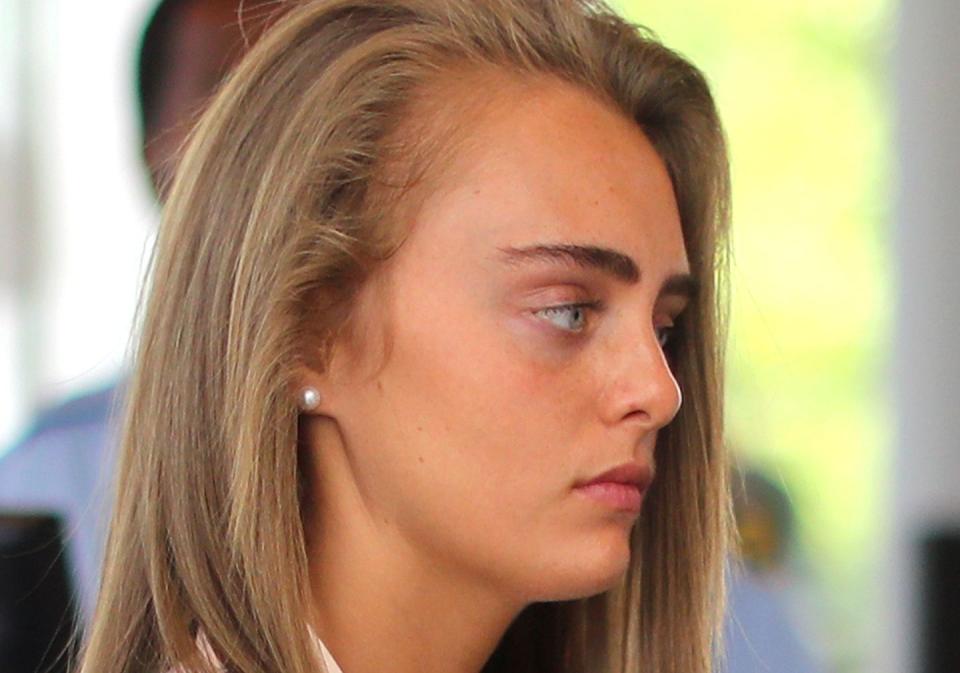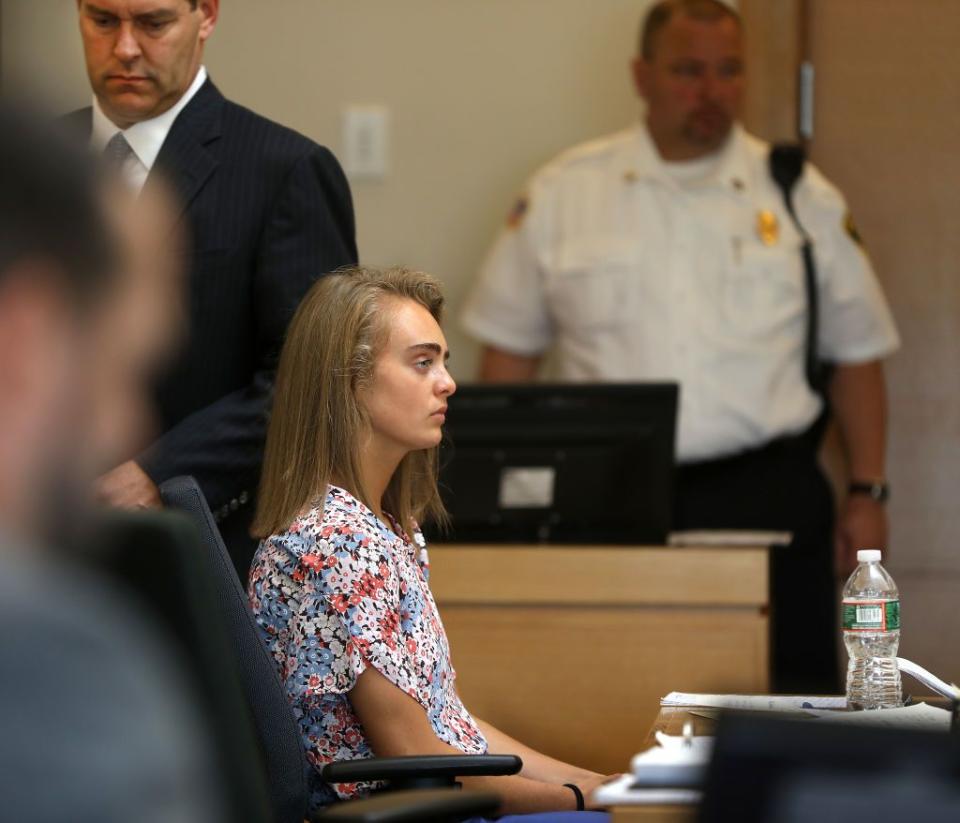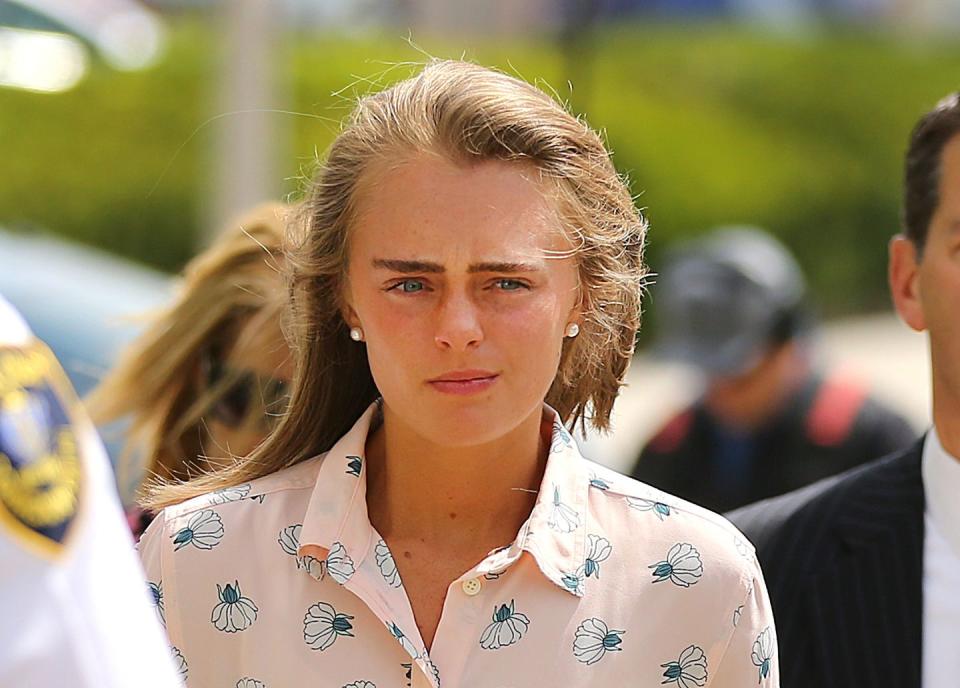'The Girl From Plainville' Thrusts Michelle Carter's Trial Back Into The Spotlight

- Oops!Something went wrong.Please try again later.
- Oops!Something went wrong.Please try again later.
Michelle Carter is back in the spotlight. After her legal trial captivated the country in recent years, it's now inspired the new Hulu drama series The Girl From Plainville.
If you need a refresher, Carter, who was 17 years old at the time she was charged with involuntary manslaughter for the role she played in the suicide of her then-boyfriend, 18-year-old Conrad Roy III. At the time of Roy’s death on July 12, 2014, Carter was at her home miles away, but prosecutors argued that her texts and phone calls encouraged Roy to take his own life.
The case ultimately centered on the legal question of whether an individual’s words could hold him or her responsible for another’s resulting actions. As it turns out, they can—at least in Carter's case.
Now, with the upcoming premiere of The Girl From Plainville, Roy's parents are speaking up and sharing their thoughts on the show. "…There may be an attempt to defend some of [Carter's] needless and evil actions," Roy’s mother, Lynn St. Denis told People. At the same time, St. Denis hopes that the show will highlight the work she did with Massachusetts lawmakers to propose Conrad's Law. If approved, suicide coercion would result in a five-year prison sentence. "I don't want another family to deal with what I had to deal with," she said.
Leading actress Elle Fanning, who plays Carter, also commented on her experience during an interview with Good Morning America. "We were careful not to sensationalize this story," explained Elle. "It would have been easy with our show to kind of romanticize suicide. We wanted to show it for what it truly is."
Okay, so... where is the real Michelle Carter now?
The 24-year-old was found guilty of the charges related to Roy's death on June 16, 2017 and was released from Bristol County jail in Dartmouth, Massachusetts on January 23, 2020, NBC Boston reported. She was released early on good behavior, officials said, after serving 12 months of her 15-month sentence. Jonathan Darling, a spokesman for the Bristol County Sheriff’s Office, spoke to MassLive about Carter's behavior while in prison. "We’ve had no problems with her at all," Darling said. "She attended programs, is getting along with other inmates and is polite to our staff."
Carter will serve five years of probation.
Carter was driven away by her attorney Joseph Cataldo. She was released roughly 3 months early for good behavior. The Bristol County Sheriff called her “a model inmate.”
📸: @pictureboston pic.twitter.com/6IDgnIbPN5— Caroline Connolly (@CConnNBCBoston) January 23, 2020
Despite the recent attention of Hollywood, Carter is staying out of the public eye. Additionally, due to her probation, it’s highly unlikely that she's left the country for any reason since her release from prison. If you’re tempted to try and find Carter on social media, you're out of luck. As may be expected, she currently does not have any accounts linked to her.

Before her release, Carter appealed her case to the Supreme Court.
Shortly after she was sentenced to 15 months for the suicide of Conrad Roy, Carter's legal team filed an appeal. Her lawyer, Joesph P. Cataldo, argued that Carter's actions were protected as free speech under the First Amendment.
But the high court didn't agree. Carter’s appeal was added to a list in January of 2020 titled "Certiorari Denied," according to NBC News. Translation: The Supreme Court refused to even hear the case. Cataldo called the Supreme Court’s decision "unfortunate" in an email to the Boston Herald. The Supreme Court's decision also meant that Carter's original conviction would stand.
The Supreme Court's decision came just four months after Carter's request for early parole was also denied, according to Mercury News.
Prior to her guilty conviction and prison sentence, Carter was a teenager who claimed to be in love.
Carter met Roy in 2012 while on vacation with their families in Florida. Both had struggled with their mental health, and both had attended therapy and counseling, according to The Cut.
The pair lived about an hour apart from each other in Massachusetts, and much of their long-distance relationship consisted of phone calls, emails, and texts.
It was the texts and, more importantly, phone calls between Carter and Roy that led to her indictment for involuntary manslaughter in February 2015, per MassLive. Carter’s lawyers battled for over a year for the charges to be dismissed, but the Massachusetts Supreme Judicial Court ruled the state could move forward. The case went to trial—with Carter pleading not guilty—in June 2017.

During the trial, Carter’s text history with Roy seemed like it would be the most damaging evidence against her.
While messages showed that she'd previously encouraged Roy to try professional therapy again, during the weeks leading up to Roy’s eventual death, she discussed suicide, laid out for him how he should do it, and, according to prosecutors, asked him when he was going to kill himself more than 40 times.
"Its probably the best time now because everyone’s sleeping," she wrote to him, per court documents. "Just go somewhere in your truck. And no one’s really out right now because it’s an awkward time...If u don’t do it now you’re never gonna do it."
But it was a phone call that sealed Carter's fate.
On the night that Roy died in a Kmart parking lot by inhaling carbon monoxide produced by a water pump in his truck, Carter was in almost constant contact with Roy and "talked him out of his doubts point by point," prosecutors argued. The turning point came when Roy got out of his truck and called Carter—she allegedly urged him to get back in.
The phone call was never recorded, so it's unknown whether that conversation transpired the way Carter later claimed it had.
Still, in texts to her friends, she acknowledged the role she played in Roy’s death. "I helped ease him into it and told him it was okay, I was talking to him on the phone when he did it I could have easily stopped him or called the police but I didn't," she wrote to her friend Sam Boardman, according to court documents.
Juvenile Court Judge Lawrence Moniz found Carter guilty and sentenced her to two and a half years in prison, but she ended up serving 12 months out of a reduced 15-month prison term.

In his ruling, Moniz said Carter’s specific instruction to Roy allegedly telling him to return to his car on the night of his death constituted "wanton and reckless conduct." He further noted that she alerted neither Roy’s family nor local authorities to his actions even though she knew Roy intended to take his own life.
Despite the guilty verdict, Carter didn't immediately go to prison.
She was allowed to remain out on bail during the initial appeals process, but, after the Massachusetts Supreme Judicial Court ruled not to overturn her conviction on February 6, 2019, Moniz ordered Carter to begin her sentence at the Bristol County Jail and House of Correction.
Just before Carter appeared in court in February, Roy’s aunt Becki Maki told the media there were "no winners" in this case, according to NBC News.
"It’s a tragedy," she said. "And we just want an end to it."
If you or someone you know is considering suicide, please contact the National Suicide Prevention Lifeline.
You Might Also Like

